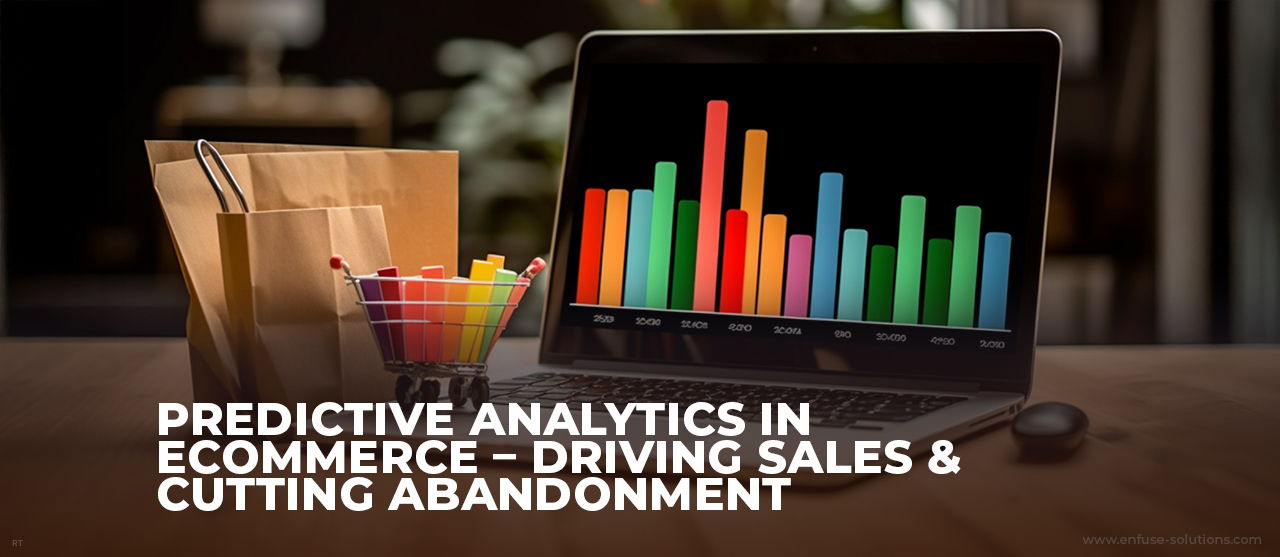
In the current dynamic eCommerce environment, it is now crucial for businesses to comprehend how customers behave. The power of predictive analytics allows brands to anticipate customer needs, optimize inventory, personalize experiences, and drive better business outcomes. With its focus on forecasting based on data-driven insights, predictive analytics is not only a tool for sales growth but also a solution to reduce cart abandonment, one of the most critical challenges facing online retailers.
What Is Predictive Analytics In eCommerce?
Predictive analytics uses machine learning, statistical techniques, and data mining to analyze historical data, identify patterns, and make predictions about future behavior. For eCommerce, this translates to anticipating customer preferences, optimizing marketing campaigns, enhancing customer service, and making real-time adjustments that lead to improved conversion rates.
eCommerce brands leverage predictive analytics to align their strategies closely with consumer expectations. In an era where consumers demand a highly personalized experience, predictive analytics has become the secret sauce for brands to thrive and differentiate.
The Impact Of Predictive Analytics On Sales And Abandonment Rates
For eCommerce brands, predictive analytics can be a game-changer for boosting sales and tackling cart abandonment. Let’s explore how it drives measurable benefits.
1. Personalized Product Recommendations
Predictive analytics empowers eCommerce platforms to recommend products that align closely with each shopper’s preferences. Using historical data and browsing behavior, machine learning algorithms predict what items a user is most likely to buy.
According to a recent report by McKinsey, businesses that use personalized recommendations see sales increase by up to 15% and customer engagement rise by up to 30%.
This level of personalization helps brands deliver experiences that feel relevant, increasing the likelihood of purchase and reducing instances of cart abandonment.
2. Optimizing Inventory And Supply Chain
Inventory management is critical in eCommerce, as both overstock and stockouts can harm sales and customer loyalty. Predictive analytics helps businesses maintain optimal inventory levels by accurately forecasting demand, identifying seasonal trends, and anticipating product lifecycles.
Research from MarketsandMarkets predicts that the global predictive analytics market will grow at a compound annual growth rate (CAGR) of 21.7% from 2021 to 2026, indicating strong adoption across industries.
Through predictive models, companies can align inventory with demand more effectively, ensuring customers find what they need, when they need it, reducing the risk of abandonment due to out-of-stock items.
3. Pricing Optimization
Dynamic pricing has emerged as a powerful tool in eCommerce, with predictive analytics enabling brands to set prices based on demand, competition, and customer behavior. By analyzing competitor pricing, market trends, and individual shopper behavior, predictive analytics allows eCommerce platforms to adjust prices in real time.
A report by Gartner indicates that companies using predictive analytics for dynamic pricing experience an average 10-15% increase in revenue and a 20% increase in sales conversions.
Effective pricing strategies attract budget-conscious consumers and drive purchasing decisions, making it less likely that customers will abandon their carts due to unexpected price discrepancies.
4. Enhanced Customer Retention And Loyalty Programs
Predictive analytics plays a pivotal role in creating loyalty programs that resonate with consumers. By identifying repeat purchasing behaviors and engagement patterns, brands can customize loyalty rewards and offers that meet individual preferences.
Harvard Business Review found that companies implementing predictive analytics for customer loyalty improved customer retention by up to 25%.
With accurate data-driven insights, eCommerce platforms can develop loyalty initiatives that retain customers and encourage repeat purchases, leading to lower churn and higher lifetime value.
5. Reduced Cart Abandonment Through Behavioral Predictions
One of the most frustrating challenges for eCommerce businesses is cart abandonment. Predictive analytics helps address this by detecting early indicators of potential abandonment, such as page visit frequency, time spent on product pages, and previous purchase history.
When these signs are detected, predictive models can trigger automated actions like retargeting emails, personalized discounts, or even reminders.
According to the Baymard Institute, the average cart abandonment rate across industries is nearly 70%, highlighting the need for effective strategies to tackle this issue.
Real-World Success Stories In Predictive Analytics For eCommerce
As per McKinsey reports, many major eCommerce players have adopted predictive analytics to improve their sales and reduce abandonment rates.
- Amazon: By leveraging predictive analytics, Amazon personalizes its user experience to drive higher engagement, and in 2023, it attributed up to 35% of its total sales to recommendation engines.
- Netflix: Known for its highly personalized recommendation system, Netflix’s use of predictive analytics has led to an impressive 75% of streamed content coming from user recommendations, enhancing user satisfaction and retention.
Key Benefits Of Predictive Analytics For eCommerce
- Improved Customer Insights: Understanding consumer behavior on a granular level allows for better-targeted marketing and product offerings.
- Higher Conversion Rates: With predictive personalization, businesses see higher conversions as customers are presented with relevant products.
- Cost Savings: Optimizing inventory and supply chain logistics reduces overhead and waste.
- Scalable Growth: Predictive analytics enables eCommerce companies to adjust strategies based on data, making it easier to scale.
- Enhanced User Experience: Customers like their shopping experiences more when they receive personalized prices and recommendations.
EnFuse Solutions: Powering Predictive Analytics In eCommerce
As a forward-thinking service provider, EnFuse Solutions empowers eCommerce businesses with advanced data and predictive analytics services. With expertise in harnessing data, EnFuse enables companies to leverage predictive analytics to drive sales growth, optimize inventory, and reduce abandonment. Their tailored solutions integrate seamlessly with business operations, enabling organizations to make informed decisions that align with their goals.
EnFuse Solutions’ approach emphasizes sustainable growth through data-driven insights, focusing on delivering value and measurable outcomes to clients. Whether it’s implementing cutting-edge recommendation engines or enhancing supply chain forecasting, EnFuse helps clients unlock the potential of predictive analytics.
Conclusion: Elevate Your eCommerce Business With Predictive Analytics
Predictive analytics is transforming eCommerce, empowering brands to deliver personalized experiences, optimize operations, and drive higher sales conversions. With benefits like inventory management, pricing optimization, and reduced cart abandonment, predictive analytics serves as a strategic tool for modern businesses.
EnFuse Solutions is here to help eCommerce brands leverage predictive analytics to its full potential. Whether you’re looking to reduce abandonment rates or boost your sales, EnFuse offers innovative, data-driven solutions tailored to your unique business needs.
Unlock the power of predictive analytics with EnFuse Solutions and take your eCommerce business to new heights. Get in touch with us right now to find out how data-driven forecasting might improve your financial results.

















Comment